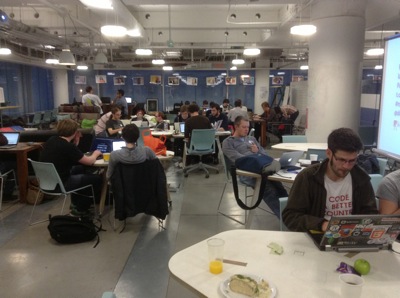
You’ll have heard of the big building in Westminster called the Houses of Parliament. Containing the House of Lords and the House of Commons it is where government in the UK is based and is full of ornate rooms, centuries old traditions and little-known rules such as not wearing hats. One day in the future, when the world is ruled from the moon and we all have jet-packs it will make superb flats overlooking the Thames, but for now it is the place where Parliament meets, debates and decides whether the UK should go to war or doughnuts should carry health warnings.
The trouble is that the most a lot of us get to see of Parliament is the weekly Prime Minister’s Question Time, when the House assembles to shout abuse at the opposing parties, sorry, I mean debate important issues of the day with the Prime Minister. Many people do not even see this and Parliament Week aims to overcome this disconnect between Parliament and the people.
Events started last Friday and continue until 21st November. You can find out what is happening in your part of the UK by visiting the Parliament Week website. There are events for adults and children, from debates and exhibitions to art and craft. Some have an emphasis on Women in democracy, others try to demystify Parliament for us. MPs and Members of the Lords are actively involved.
I intended to start Parliament Week with a visit to the Government Art Collection. ‘Modern and Contemporary Art in Office,’ was the title of the tour, and it sounded just the ticket. Do the paintings around the PM and his ministers make an impact on the decisions they make? Unfortunately when I phoned to book it turned out there were no tickets left, so I cannot report anything except next year book early.

Coders working on the Hack Parliament project
Instead I turned my attention to Hack Parliament, a weekend of coding using open data organised by Rewired State. Only a couple of centuries ago you could be put in the Tower for publishing what was said in Parliament – a fate which one editor tried to avoid by claiming the debates he published were from not from Parliament at all, but rather the Proceedings of the Lower Room of the Robin Hood Society. Today huge amounts of data come out of Government and programmers were asked to use this to create new software applications. One group I spoke to were working on a way to link the written reports of debates (known as Hansard) with the video records of the same debates, in order to get a sense of how something was said, as well as what was actually said, as Hansard is a cleaned up version of what was intended. Hansard can be corrected, but the video will remain as it was. Another group was working on a tool to help MPs better understand what their constituents thought on a subject, using data from They Work For You.

The Museum of British Invention
Outside Parliament was a less technical way of interacting with the House of Commons. On Abingdon Street you could visit The Travelling Museum of British Invention. This grand name suggests a smaller V&A, a national gallery on a par with the Tate, but rather – in an enjoyably eccentric way – a huge number of British inventions have been brought together on an old bus. Ideal for children to investigate, there are cabinets to examine and doors to open, all giving information about British inventions over the centuries. How does this fit in with Parliament I hear myself ask. The success of several of the inventions can be linked to the involvement of Parliament. They backed the idea of a fixed-price postage stamp in 1839, leading to the postal systems that we have today. Parliament put up the large sum of £20,000 in 1774 as a prize for anyone who could invent a means of calculating longitude at sea, leading to the creation of the Marine Chronometer. They were also involved in forcing the use of the Plimsoll line to avoid overloading of ships as well legislating to help the spread of the railways. Thanks to Parliamentary purchases the humble pencil was developed commercially – as a tool of spies! The exhibition shows that what happens in Parliament has a direct effect on the lives of people in the UK and around the world.
Parliament week continues until 21st November all around the country.There is also a Young Poet Laureate in residence in the Parliament for the week!

Leave a Reply